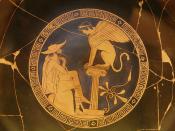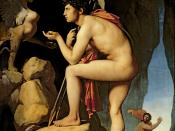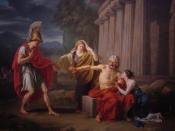The philosopher Aristotle laid the foundations for literary criticism of a Greek tragedy. This famous criticism allowed for audiences and readers alike to determine whether or not a literary work can be classified as a tragedy. Aristotle's ideas center around three vital effects: (the audience develops an emotional attachment to the tragic hero; secondly, the audience fears what will become of the hero; and finally the audience pities the suffering hero, at his moment of death, Larry A. Brown) Throughout the tragedy the audience undergoes a catharsis, a term Aristotle borrowed from the medical writers of the day, which means (a purging or purification of the emotions, Webster?s Encyclopedia Dictionary.) Undoubtedly, for Aristotle's theory to succeed, the tragic hero must be complex and well-constructed, as in Sophocles' Oedipus the King. As a tragic hero, Oedipus obtains the three needed responses from the audience on a higher level than most. A careful examination of Oedipus reveals that he justifiably deserves the title of Tragic Hero, whereas Pecola of The Bluest Eye, by Toni Morrison does not, due to the fact the she fills two out of the four essential requirements to be a tragic hero.
She lacks the respect of the reader and she ultimately does not die at the end of the novel.
In Aristotle's definition, (all tragic heroes must have a "harmartia" (Tragic Flaw) Larry A. Brown). A kind of human failing and human weakness. Oedipus fits this exactly, his basic flaw is his lack of knowledge about his own identity. In addition, no amount of insight or preventative action could fix Oedipus' tragic flaw. Oedipus has no responsibility for his flaw. The audience fears for Oedipus because nothing he does can change the tragedy's outcome. In relation to Pecola, her flaw has been produced not...


